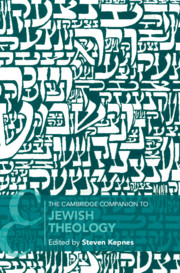Book contents
- The Cambridge Companion to JEWISH THEOLOGY
- cambridge companions to religion
- the cambridge companion to JEWISH THEOLOGY
- Copyright page
- Contents
- Notes on Contributors
- Acknowledgements
- 1 Introduction
- 2 What is Jewish Theology?
- Part I Biblical-Rabbinic
- Part II Medieval
- Part III Modern
- 9 R. Kook: A This-Worldly Mystic
- 10 Rosenzweig’s Midrashic Speech-Acts: From Hegel and German Nationalism to a Modern-day Ba’al Teshuvah
- 11 Levinas’ Theological Ethics
- Part IV Contemporary Issues
- Part V Analytic Philosophy and Theology
- Index
- Other Titles in the Series (continued from page ii)
- References
10 - Rosenzweig’s Midrashic Speech-Acts: From Hegel and German Nationalism to a Modern-day Ba’al Teshuvah
from Part III - Modern
Published online by Cambridge University Press: 03 December 2020
- The Cambridge Companion to JEWISH THEOLOGY
- cambridge companions to religion
- the cambridge companion to JEWISH THEOLOGY
- Copyright page
- Contents
- Notes on Contributors
- Acknowledgements
- 1 Introduction
- 2 What is Jewish Theology?
- Part I Biblical-Rabbinic
- Part II Medieval
- Part III Modern
- 9 R. Kook: A This-Worldly Mystic
- 10 Rosenzweig’s Midrashic Speech-Acts: From Hegel and German Nationalism to a Modern-day Ba’al Teshuvah
- 11 Levinas’ Theological Ethics
- Part IV Contemporary Issues
- Part V Analytic Philosophy and Theology
- Index
- Other Titles in the Series (continued from page ii)
- References
Summary
This chapter situates Franz Rosenzweig’s unique and influential contributions to Jewish theology in his Christian historicist and philosophical context of modern European civilization. Doing so allows us to best understand his theological contributions with the interdependent two-fold Jewish exilic tradition of interpreting the Torah as an engaged, dialectical response from the dual perspectives of the living Scriptural authority of their respective communities of faith and the non-Jewish and increasingly secular contexts in which they found themselves. The chapter unfolds as an interpretation that is based on Rosenzweig’s introduction of a novel methodological speech-act philosophy that he calls New Thinking which takes shape in the midrashic form of a messianic aesthetics. Simon claims that this approach enables Rosenzweig to set out a normative guide of teaching-as-practice throughout the entirety of The Star of Redemption, in order to bring the structures of the inter-related processes of Creation, Revelation, and Redemption into functional and dynamic ethical relations.
- Type
- Chapter
- Information
- The Cambridge Companion to Jewish Theology , pp. 213 - 238Publisher: Cambridge University PressPrint publication year: 2020



